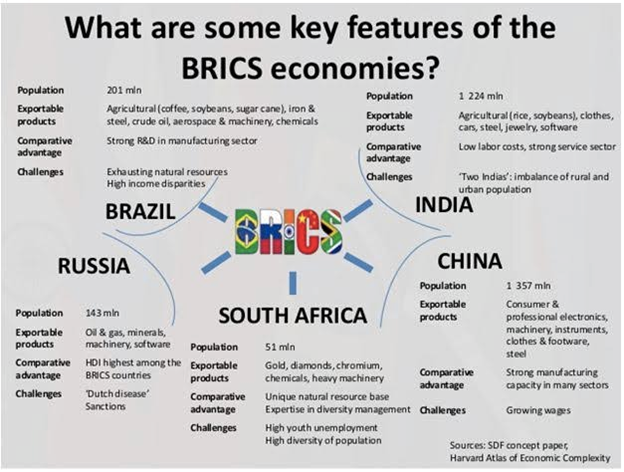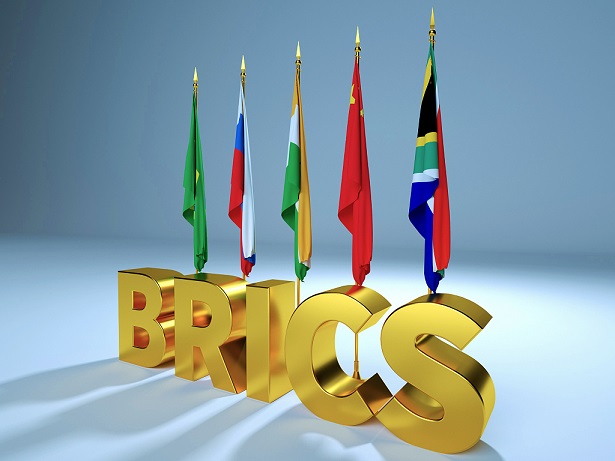India welcomes consensus-based approach to expand BRICS: PM
Relevance
- GS Paper- 2 International Relations.
- Tags: #BRICS #upsc #competitiveexams #PM #IR.
Why in the news?
- India welcomes the expansion of the BRICS grouping through a consensus-based approach, Prime Minister Narendra Modi declared in Johannesburg on Wednesday.
- Addressing the plenary session of the 15th BRICS summit in the historic South African city, the PM urged member States to take advantage of India’s digital solutions and to work for the welfare of the Global South.
- “125 countries participated in the Global South summit that we organized this January. The plenary session was also attended by Brazilian President Luiz Inacio Lula Da Silva, Chinese President Xi Jinping, and the host, South African President Cyril Ramaphosa, alongside other delegates.
| Topic | Information |
| BRICS (founded: 2009; HQ: Shanghai) is an acronym for the grouping of the world’s leading emerging economies, namely Brazil, Russia, India, China, and South Africa (included in 2010). | |
| Origin | The term “BRIC” was coined by the British Economist Jim O’Neill in 2001 to describe the four emerging economies of Brazil, Russia, India, and China. |
| Share of BRICS | BRICS brings together five of the largest developing countries, representing 41% of the global population, 24% of the global GDP, and 16% of the global trade (By 2028, BRICS is expected to make up 35 per cent of the global economy) |
| Chairmanship | The chairmanship of the forum is rotated annually among the members, in accordance with the acronym B-R-I-C-S. South Africa is the chair for 2023. |
| Initiatives of BRICS | 1. New Development Bank (NDB) 2. Contingent Reserve Arrangement (CRA) 3. BRICS Payment System 4. Customs Agreements 5. Remote Sensing Satellite |
| New Initiative | BRICS is planning to launch its own “new currency” system, a major step towards de-dollarization (reducing dependence on the US dollar for trade) |
Importance of BRICS for India
| Importance | Example |
| Geo-Politics | BRICS provides India with an opportunity to balance its strategic interests between the US and the Russia-China axis. |
| Global Economic Order | BRICS plays an important role in the G20, in shaping global economic policies and promoting financial stability. |
| Voice of Developing Nations | BRICS has emerged as the voice of developing countries and is playing a significant role in protecting the rights of developing countries. |
| Terrorism | BRICS provides a platform for India to galvanize its efforts against terrorism and has worked within the grouping to take a strong stand against terrorism. |
| Global Grouping | BRICS provides an opportunity for India to actively engage with China and resolve mutual disputes. It also helps in garnering support from other partner countries. |
Challenges for BRICS
| Challenge | Example |
| Economic Divergence | Brazil and Russia have been experiencing economic recessions in recent years, while China and India have sustained high growth rates. South Africa’s economy has been performing poorly, with high levels of unemployment and inequality. |
| Political Differences | Russia’s annexation of Crimea and involvement in conflicts in Ukraine and Syria have strained its relations with other BRICS members. China’s territorial claims in the South China Sea have been a source of tension with other BRICS countries that have competing claims in the region. |
| Institutional Constraints | The New Development Bank (NDB), established by BRICS in 2014 to provide development financing, has faced challenges in disbursing loans and identifying viable projects. The Contingent Reserve Arrangement (CRA), a pool of foreign exchange reserves, has not been tested yet. |
| Coordination Difficulties | Disagreements over the governance structure of the NDB and the CRA, as well as differing priorities in areas such as trade, investment, and climate change, have made it difficult for BRICS to present a unified front on many issues. |
| External Pressures | The rise of protectionism, nationalism, and populism in some advanced economies has posed challenges for BRICS in terms of trade, investment, and access to capital. |
Way forward for BRICS
| Example | |
| Reform of Multilateral Institutions | BRICS countries could jointly advocate for the reform of the UN Security Council, calling for the inclusion of more developing countries as permanent members. |
| Resolve to Combat Terrorism | BRICS countries could share best practices and intelligence to combat terrorism, as well as work together to cut off funding and resources for terrorist groups. |
| Promoting Technological and Digital Solutions for the SDGs | BRICS countries could share their experiences in adopting and implementing digital solutions in these sectors |
| Expanding People-to-People Cooperation | BRICS countries could organize joint cultural events and exhibitions, establish more student exchange programs and scholarships, and encourage more tourism and business visits to each other’s countries. |
India’s geopolitical choices and challenges
- India’s Geopolitical Position: India’s geopolitical choices are complex, with uncertainty about its role in global geopolitics.
- Non-Western Participation Rationale: India’s participation in non-western forums like the BRICS and the SCO stems from the inequities of post-World War II institutions.
- Balancing Multiple Affiliations: India belongs to BRICS, SCO, and the global South due to historical, developmental, and geographical factors.
- Balancing China’s Presence: China’s dominance in BRICS and other forums poses challenges for India, as it also aspires to engage in the G-20, G-7, and Quad.
- India’s Geopolitical Dilemma: India stands at an emerging geopolitical faultline, balancing interests and affiliations.
Competing blocs and India’s strategy
- Rise of Competing Blocs: China and Russia aligning against the U.S. risks creating competing blocs that challenge the status quo.
- India’s Opposition to Blocs: India historically opposes bloc politics in favor of equitable global governance and multipolarity.
- Inevitable Involvement in Bloc Dynamics: Despite opposition, India might be drawn into bloc dynamics due to complex geopolitical factors.
China’s Global Rise and India’s Choices
- India’s China Dilemma: India must consider whether its pursuit of a multipolar world aids China’s global rise.
- Impact of Global Forums: Strong global forums can inadvertently strengthen China’s global influence, impacting India’s choices.
- Balancing Geopolitical Forces: India faces the challenge of balancing its commitment to equitable global governance with safeguarding its national interests.
Why BRICS important for India
- In the last two decades, BRICS has carried out a long and glorious journey. Our new development bank is playing an important role for the development of the countries of the Global South.
- We have built a financial safety net through BRICS Contingent Reserve Arrangement (CRA).
- BRICS cooperation during the COVID-19 pandemic and the joint building of digital solutions as some of the success stories of the outfit, and urged member States to take advantage of India’s diversity to create a digital partnership.
- Diversity is a very big strength of India. Solution to problems in India are tested in India’s diverse environment and that is why any solution that can cater to the Indian needs can be implemented anywhere else in the world.
- BRICS faces several challenges such as internal differences, global economic slowdown, and geopolitical tensions.
- However, the group can remain relevant by expanding its agenda to promote comprehensive development and enhanced cooperation among all states.
- BRICS should also focus on the democratization of international issues, respect for cultural diversity, and peaceful resolution of conflicts.
Way Forward
- BRICS’ Role: BRICS can serve as an alternative platform to address global governance deficiencies, despite its imperfections. It could initiate discussions on more inclusive global governance.
- Navigating Complexity: India’s geopolitical choices are complex due to its affiliations in various forums. India’s participation in non-Western platforms reflects a response to historical inequities.
- Balancing Geopolitical Shifts: As competing blocs emerge, India must balance affiliations between a China-centric and a West-centric world order. Striking this balance is crucial to India’s global positioning.
- Managing China’s Rise: India needs to consider whether its actions inadvertently support China’s ascent. While India must moderate China’s influence, it should avoid alienating other global South nations.
- Safeguarding National Interests: India’s active participation in global forums must align with promoting equitable global governance while ensuring its national interests are safeguarded.
Source: The Hindu
Mains Question.
Discuss the importance of BRICS for India. How BRICS is helping India to grow in areas of economy and geo-politics?





